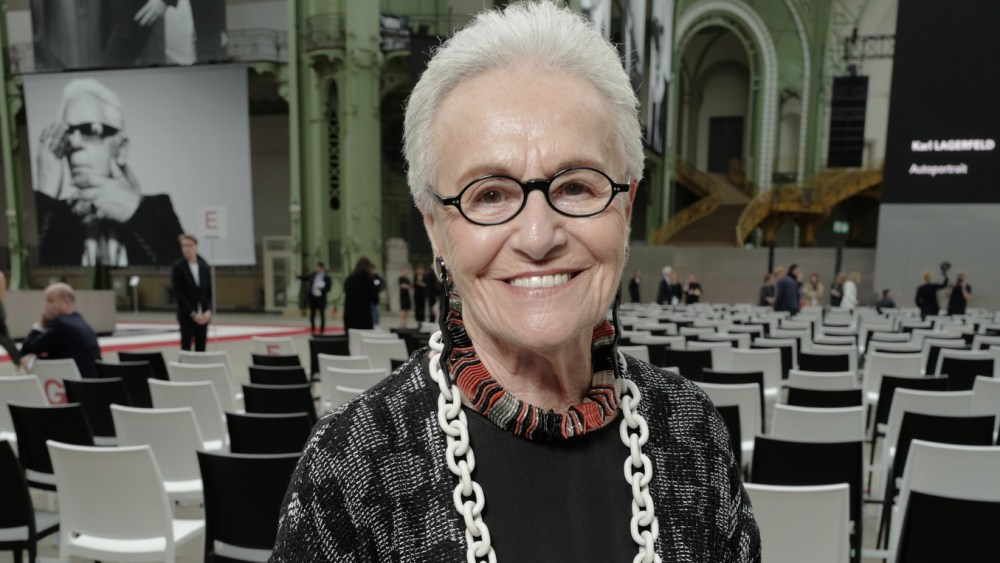MILAN – Rosita Missoni, a key point of reference for the Missoni family and a cofounder of the fashion brand, has died at age 93.
She met her husband Ottavio, known as Tai, in 1948, when he was competing in the London Olympics. The then-Rosita Jelmini was on an English language course chaperoned by the Swiss Sisters of the Holy Cross.
“After visiting castles and museums, the nuns concurred that a trip to Wembley [where the Olympics were being held] was a must,” she recalled. “That’s when I saw Tai; he passed right alongside me, and I couldn’t help but notice how good looking and athletic he was. And I predicted he would win because he was racing with the number 331 on his sports bib and seven [adding the digits] had always been my lucky number.” (Tai Missoni competed at the Olympics in the 400-meter hurdles, where he won his quarterfinal and would finish sixth in the final, and in the 4×400 meter relay, where the team did not finish.)
They married in 1953 in Golasecca and settled in Gallarate, both towns in Lombardy. In Gallarate that year, the couple set up a small knitwear workshop they called Maglificio Jolly. Tai Missoni had begun dabbling in fashion six years earlier when, along with his friend and teammate Giorgio Oberweger, he produced wool tracksuits to be worn by the Italian Olympic team in London. His trainer had a small knitting company in Trieste, a city in northeastern Italy, and together they made the first wool tracksuits which, he marveled later in his typical understated way, met with strong demand.
The Missonis were often described as “color geniuses” and were the first to make coordinating separates in different patterns, a zigzag top with a polka dot skirt, for example.
The zigzag patterns came about as a result of using technology that they hadn’t tried before. “We could only do stripes, and then we started doing horizontal and vertical and little by little added more complicated stitches, plaids and jacquards,” Rosita recalled. “Then we found the Raschel machines that do the zigzag, and that was that. My grandparents had used them to make multicolored embroidered shawls with big rose patterns and long fringes, all hand-knotted, the kind you throw on lampshades.”
In 1967, the Missoni presentation at Palazzo Pitti became a scandal because the pair had sent models down the runway braless in lamé tops. They were briefly banned from showing there.
While building the Missoni company together and expanding the brand around the world — famously sponsored by Diana Vreeland in the U.S. — the couple shared a belief in remaining artisans and growing at a sustainable pace. “Tai would say, why work more if we can’t have the time to enjoy and spend what we earn?” Rosita recalled.
They built a house surrounded by trees and flowers and overlooking the majestic Mount Rosa near the factory in Sumirago, raising their children Vittorio, Angela and Luca there. It was a home that became a meeting point for their friends, artists and journalists, where the informal and welcoming atmosphere never changed through the years — excellent wine and food included. Beginning in 1996, Tai and Rosita gradually passed control of their fashion empire to their children Luca, Vittorio and Angela, handing the design responsibilities to their daughter. In January 2013 — the family’s annus horribilis — Vittorio Missoni died in a plane crash off the Venezuelan coast. In May that same year, his father died at age 92.
In 2018, FSI Mid-Market Growth Equity Fund acquired a 41.2 percent stake in the company, while the Missoni family retained control with 58.8 percent of the shares. Rosita maintained the title of honorary president, continuing to be involved in the brand’s home collection – a project always close to her heart. In fact, in 2006 Rosita spearheaded a deal with Rezidor SAS, signing an international licensing agreement to develop a new luxury brand in the hotel industry: Hotel Missoni. The first three were opened within two years in Edinburgh, Dubai and Kuwait. The agreement was terminated after a few years, much to Rosita’s chagrin.
Upon the sale, her daughter Angela took on the role of president, eventually relinquishing the creative director title.

